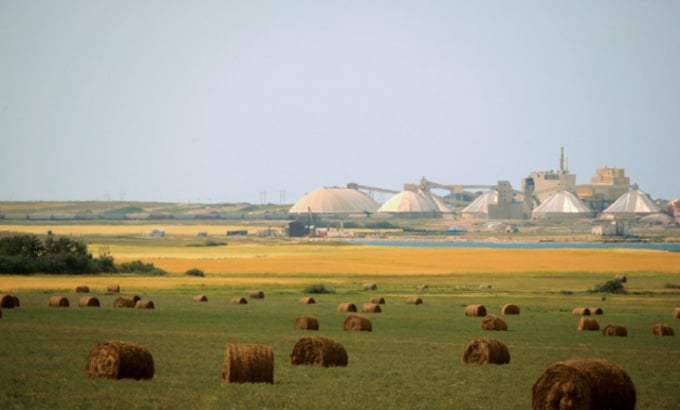December 9, 2025 | 23:26 GMT +7
December 9, 2025 | 23:26 GMT +7
Hotline: 0913.378.918
December 9, 2025 | 23:26 GMT +7
Hotline: 0913.378.918

Nutrien says it expects high natural gas prices and sanctions on Russia to push more fertilizer production to North America.
The Canadian fertilizer company Nutrien says it will increase production of the potassium fertilizer potash as the war in Ukraine disrupts the supply of fertilizer from Russia and Belarus. The company says it will produce 18 million metric tons of potash annually by 2025, a 40% increase over its 2020 capacity.
“We expect supply challenges across energy, agriculture, and fertilizer markets to persist well beyond 2022,” Nutrien CEO Ken Seitz said during a recent investor presentation.
Russia and Belarus produced about 35% of the world’s potash in 2020, and economic sanctions stemming from Russia’s invasion of Ukraine have made that fertilizer harder to access. Canada produces more potash than any other country, and many countries that previously relied on Belarus and Russia for potash, such as Brazil, are now turning to Canada.
Seitz said he expects those sanctions to have a lasting impact, pushing customers toward more reliable suppliers.
The sanctions are already affecting fertilizer companies with ties to Russia. In March, the European Union imposed sanctions on Andrey Melnichenko, a Russian industrialist who owns the fertilizer producer EuroChem, which has several fertilizer factories in Russia. He resigned and transferred ownership of the company to his wife, but now the EU has placed sanctions on her as well.
David Widmar, co-founder of the research firm Agricultural Economic Insights, says it’s not yet clear how big of an impact the sanctions will have. “We will expect somebody to buy fertilizer from Russia at a given price. The question is, how much?” Widmar asks.
Nutrien is also increasing nitrogen fertilizer production. The company says high prices for natural gas, the main feedstock for nitrogen fertilizers, are also going to shift more nitrogen production to North America, where natural gas is relatively cheap. The company previously announced the addition of 500,000 metric tons of nitrogen fertilizer capacity and is now considering further expansion.
Earlier this month, high natural gas prices forced CF Industries to permanently close an ammonia plant in the UK. The plant hadn’t been producing since September 2021. CF has continued operating a second UK ammonia plant with support from the UK government.
The good news for farmers is that fertilizer prices are starting to level off. For the first time since November 2020, the majority of fertilizer prices tracked by the farming publication Progressive Farmer fell slightly in early June.
cen.acs.org

(VAN) Initiative launched in Cairo honors villages that are helping drive agrifood systems transformation.

(VAN) The European Union agreed Wednesday to phase out Russian natural gas imports by late 2027 as part of an effort to end the bloc’s decade-long dependency on Russian energy.

(VAN) Indonesia plans a US$1.2 billion investment in feed mills to boost poultry feed production.

(VAN) Japan's average retail rice price hit a new record high for the first time in three weeks, according to agriculture ministry data.

(VAN) The use of antibiotics in treating livestock in the UK has fallen, according to a new report released by the government’s Veterinary Medicines Directorate.

(VAN) Newly designated initiatives in Australia, Canada and South Africa represent science-based and inclusive examples of ecosystem restoration.

(VAN) Rice-based food has been selected as Japan's 'Dish of the Year' for 2025, reflecting public interest in the stable supply of the country's staple food amid a recent rice shortage.